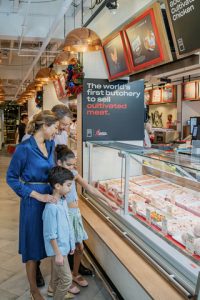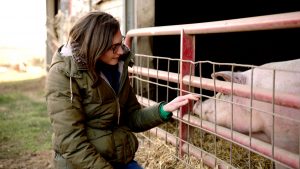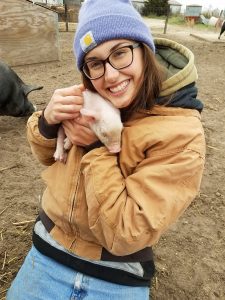Singapore Grocery Selling GOOD Meat Cultivated Chicken
 Huber’s Butchery, one of Singapore’s premier producers and suppliers of high-quality meat products, will become the first butchery in the world to sell and serve cultivated chicken. With the introduction of the latest version of GOOD Meat’s cultivated chicken, the family-owned and operated business is thrilled to add a new, locally produced offering to its display case and bistro menu.
Huber’s Butchery, one of Singapore’s premier producers and suppliers of high-quality meat products, will become the first butchery in the world to sell and serve cultivated chicken. With the introduction of the latest version of GOOD Meat’s cultivated chicken, the family-owned and operated business is thrilled to add a new, locally produced offering to its display case and bistro menu.
Through Saturday, Dec. 10, invited guests will get an early taste of the cultivated chicken dishes that will be available weekly starting in January for in-restaurant dining by reservation, while supplies last. The special preview coincides with the second anniversary of GOOD Meat’s historic launch in Singapore and follows last month’s United Nations Climate Change Conference in Egypt where the company’s chicken was enjoyed by global climate leaders, media and members of civil society for the first time outside of Singapore.
 “Offering this new approach to making meat at a butchery is another historic moment in the long road to making our food system more delicious and sustainable. I’m very proud to partner with the Huber’s team to give people a whole new way to experience our cultivated chicken in the new year,” said Josh Tetrick, co-founder and CEO of Eat Just.
“Offering this new approach to making meat at a butchery is another historic moment in the long road to making our food system more delicious and sustainable. I’m very proud to partner with the Huber’s team to give people a whole new way to experience our cultivated chicken in the new year,” said Josh Tetrick, co-founder and CEO of Eat Just.
“When we founded our butcher shop, we made it our mission to provide top quality and exceptional tasting meat products with the highest food safety standards at an affordable price. Partnering with GOOD Meat is in keeping with that vision and the realities of our ever-changing food system,” said Huber’s Butchery Managing Director Ryan Huber. “Cultivated meat could be one of the solutions to over-farming due to increased population size and density and an increase in animal protein consumption in many parts of the world,” added Executive Director Andre Huber.
GOOD Meat won regulatory approvals for its chicken in Singapore in November 2020 and December 2021. It remains the only cultivated meat producer in the world with the ability to sell to consumers. Since launch, the company’s chicken has been featured on menus at local fine dining establishments, roadside hawker stalls and via foodpanda, Asia’s leading food and grocery delivery platform.
For news of interest to the specialty food industry, subscribe to Gourmet News.
Niman Ranch Farmer Advocate Honored by Forbes
 Elle Gadient, 27, farmer advocate for premium meat brand Niman Ranch, has been recognized on the prestigious 2023 Forbes 30 Under 30 Food and Drink list. The annual list features young leaders and entrepreneurs “redefining the way we eat, drink and think about consumption.” This acknowledgement honors Gadient’s dedication and passion for supporting independent U.S. family farmers and ranchers and sustainable agriculture.
Elle Gadient, 27, farmer advocate for premium meat brand Niman Ranch, has been recognized on the prestigious 2023 Forbes 30 Under 30 Food and Drink list. The annual list features young leaders and entrepreneurs “redefining the way we eat, drink and think about consumption.” This acknowledgement honors Gadient’s dedication and passion for supporting independent U.S. family farmers and ranchers and sustainable agriculture.
“I am incredibly humbled and honored to be included on this list along with such impressive leaders,” Gadient said. “Growing up on a farm, supporting fellow small family farmers and sustainable agriculture has always been core to who I am. I am so thankful I am able to spend my days helping farming and ranching families, like mine, in the Niman Ranch network and beyond.”
 Gadient grew up on her family’s diversified farm in eastern Iowa raising livestock, including Niman Ranch pigs, and will be the fifth generation in her family to farm in the Midwest. Gadient serves as farmer advocate at Niman Ranch, charged with providing support, education and community building among the brand’s network of hundreds of small to mid-size, independent family farms and ranches across the country. All Niman Ranch farms are Certified Humane and committed to raising livestock without antibiotics, hormones or crates.
Gadient grew up on her family’s diversified farm in eastern Iowa raising livestock, including Niman Ranch pigs, and will be the fifth generation in her family to farm in the Midwest. Gadient serves as farmer advocate at Niman Ranch, charged with providing support, education and community building among the brand’s network of hundreds of small to mid-size, independent family farms and ranches across the country. All Niman Ranch farms are Certified Humane and committed to raising livestock without antibiotics, hormones or crates.
“Since its establishment with the company’s founding farmers, Niman Ranch has built a model that ensures small, sustainable farmers have a market in a rapidly changing food system,” said Chris Oliviero, general manager of Niman Ranch. “Elle has taken the baton, providing a central hub and company voice for our farmer and rancher network, understanding firsthand the challenges farmers and rural communities face in today’s agriculture climate.”
While the average age of farmers in the United States is nearly 60, Niman Ranch’s average farmer age is 43 years old. This is credited to the opportunities and support the company, many led by Gadient, provide for beginning farmers. Since joining the Niman Ranch team in 2018, Gadient has been a key leader in several impactful farmer support programs including a farmer mentor program that matches beginning farmers with more seasoned producers as well as a new grant program to help young farmers improve their operations and adopt regenerative practices.
Gadient graduated from Wartburg College in Waverly, Iowa, with majors in environmental science and business administration. Throughout college, Gadient was a Niman Ranch Next Generation Foundation scholarship recipient, including being awarded the first Phyllis Willis Pioneer Award in 2017, recognizing her passion for sustainability. In addition to her role as farmer advocate, Gadient serves as secretary for the Niman Ranch Next Generation Foundation and regularly travels back home to Iowa to help on the family farm.
For news of interest to the specialty food industry, subscribe to Gourmet News.
FDA Supports Innovation of Cell Culture Technology in Foods
 The Food and Drug Administration put its support behind cell culture technology for foods intended for human consumption. FDA Commissioner Robert M. Califf and the director of the FDA’s Center for Food Safety and Applied Nutrition issued this statement:
The Food and Drug Administration put its support behind cell culture technology for foods intended for human consumption. FDA Commissioner Robert M. Califf and the director of the FDA’s Center for Food Safety and Applied Nutrition issued this statement:
“The world is experiencing a food revolution and the U.S. Food and Drug Administration is committed to supporting innovation in the food supply. As an example of that commitment, today we are announcing that we have completed our first pre-market consultation of a human food made from cultured animal cells.
“The agency evaluated the information submitted by UPSIDE Foods as part of a pre-market consultation for their food made from cultured chicken cells and has no further questions at this time about the firm’s safety conclusion.
“Before this food can enter the market, the facility in which it is made also needs to meet applicable U.S. Department of Agriculture (USDA) and FDA requirements. In addition to the FDA’s requirements, including facility registration for the cell culture portion, the manufacturing establishment needs a grant of inspection from USDA-Food Safety and Inspection Service (FSIS) for the harvest and post-harvest portions and the product itself requires a USDA mark of inspection.
“The regulation of cell culture technology is being done collaboratively and in close partnership with USDA-FSIS for food made from cultured livestock or poultry cells. Under the March 2019 formal agreement, both agencies agreed to a joint regulatory framework wherein the FDA oversees cell collection, cell banks, and cell growth and differentiation. The FDA’s approach to regulating products derived from cultured animal cells involves a thorough pre-market consultation process. While this is not considered an approval process, it concludes when all questions relevant to the consultation are resolved. A transition from the FDA to USDA-FSIS oversight will take place during the cell harvest stage. USDA-FSIS will oversee the post-harvest processing and labeling of human food products derived from the cells of livestock and poultry. This closely coordinated regulatory approach will ensure that cell-cultured products derived from the cell lines of livestock and poultry meet federal regulations and are accurately labeled. Both agencies are working with manufacturers to ensure these products meet all applicable FDA and USDA-FSIS requirements.
“Advancements in cell culture technology are enabling food developers to use animal cells obtained from livestock, poultry, and seafood in the production of food, with these products expected to be ready for the U.S. market in the near future. The FDA’s goal is to support innovation in food technologies while always maintaining as our first priority the safety of the foods available to U.S. consumers. The FDA has extensive experience in food safety assessment across a wide range of food production technologies, including the use of biological systems and biotechnology. The agency is evaluating new substances all the time as industry practices evolve to meet consumer demands and preferences. Food made with cultured animal cells must meet the same stringent requirements, including safety requirements, as all other food regulated by the FDA.
“The FDA is ready to work with additional firms developing cultured animal cell food and production processes to ensure their products are safe and lawful under the Federal Food, Drug, and Cosmetic Act. We also plan to issue guidance to assist firms that intend to produce human foods from cultured animal cells to prepare for pre-market consultations. The published draft of this guidance will provide a formal opportunity to the public for comment. We are already engaged in discussion with multiple firms about various types of products made from cultured animal cells, including those made from seafood cells, which will be overseen solely by the FDA. We continue to encourage firms to enter into dialogue with us often and early in their product development phase, well ahead of making any submission to us.”
For more news of interest to the specialty food industry, subscribe to Gourmet News.






